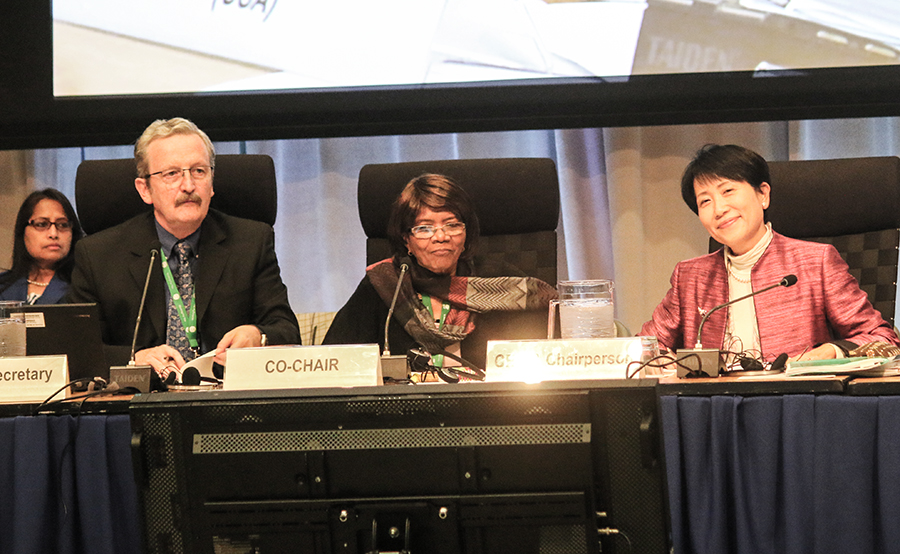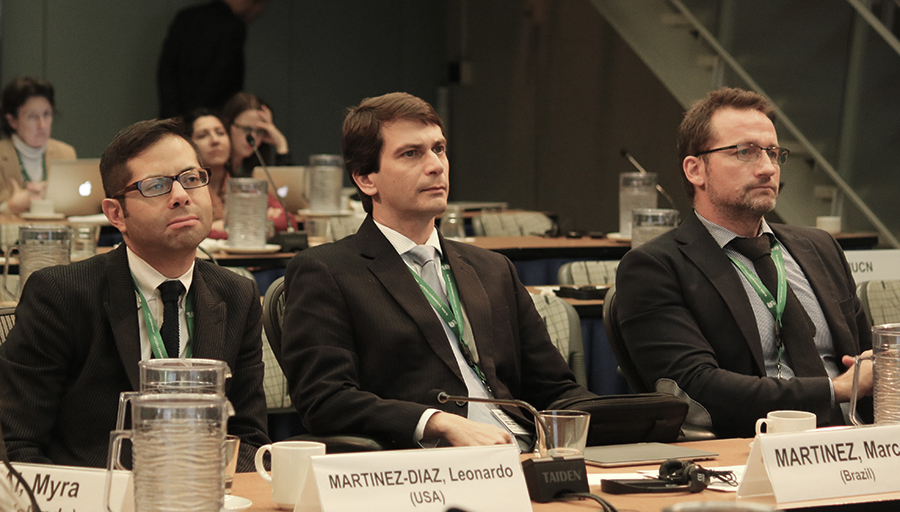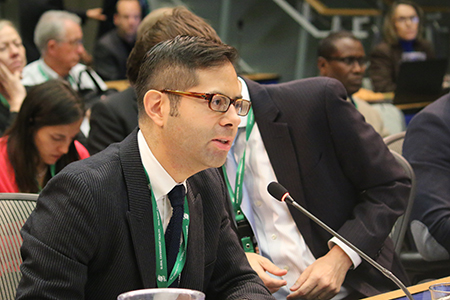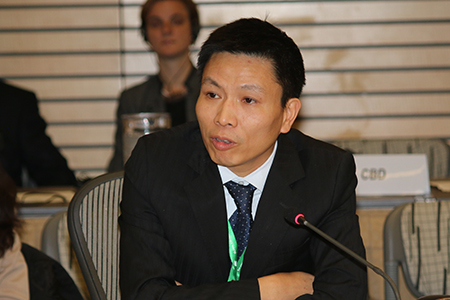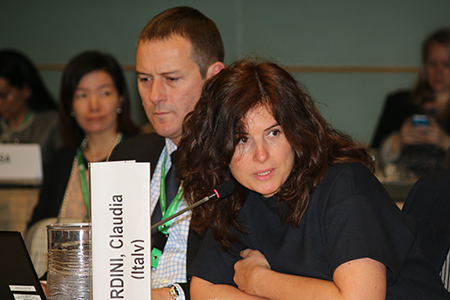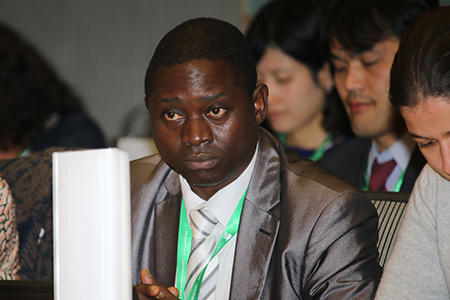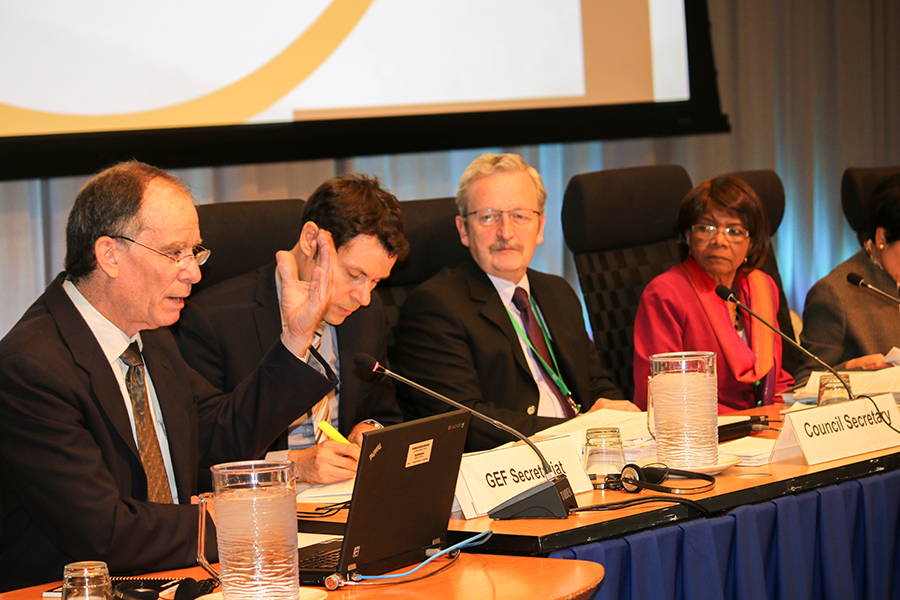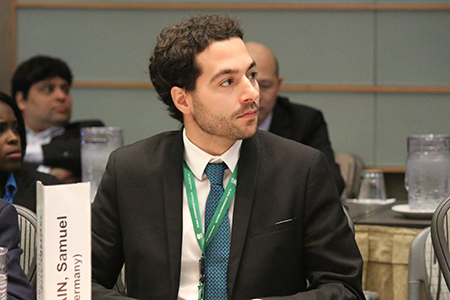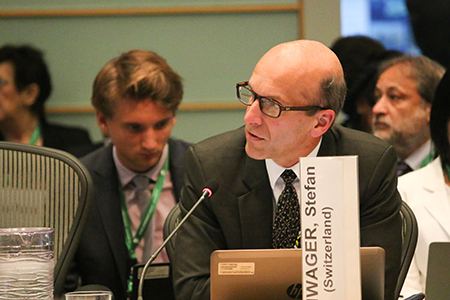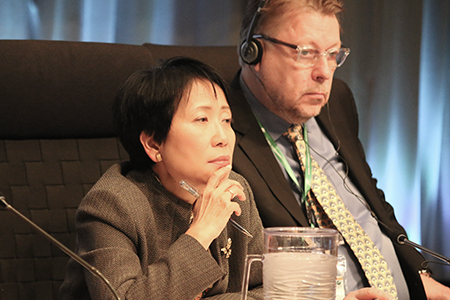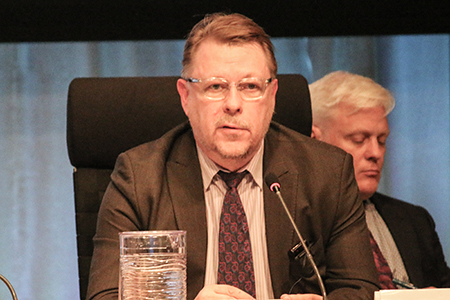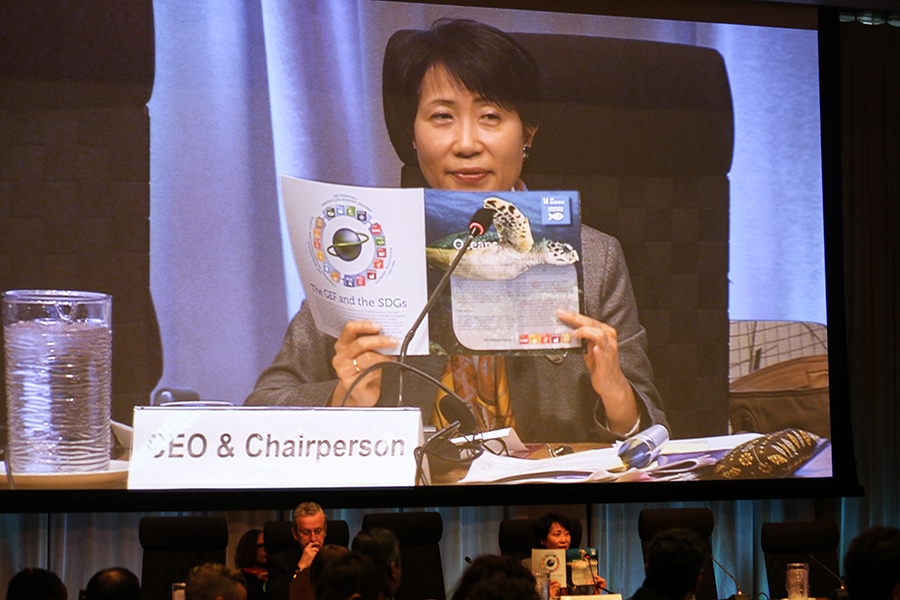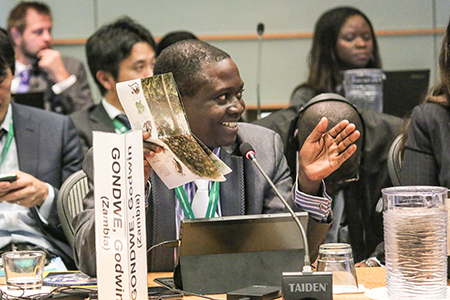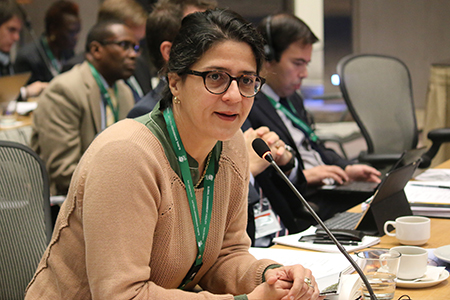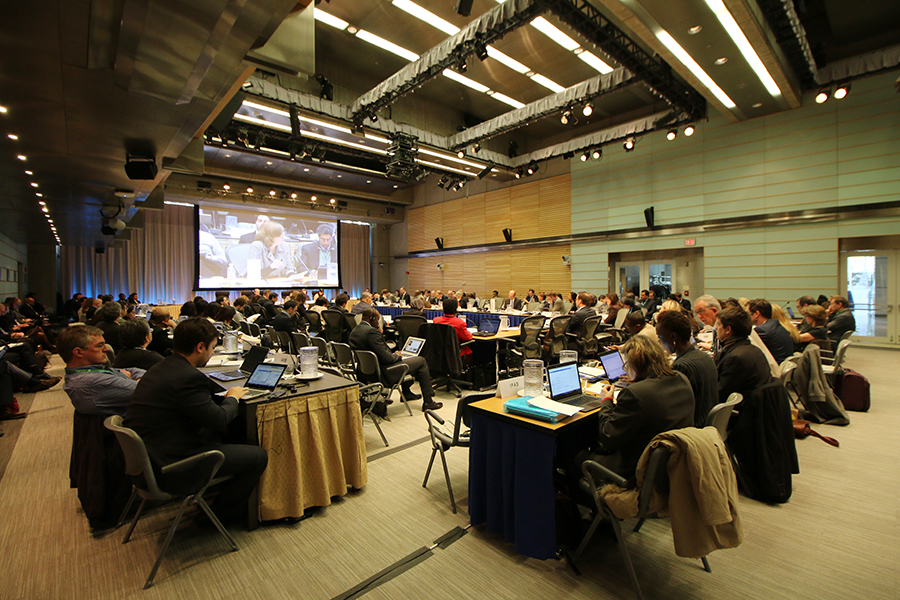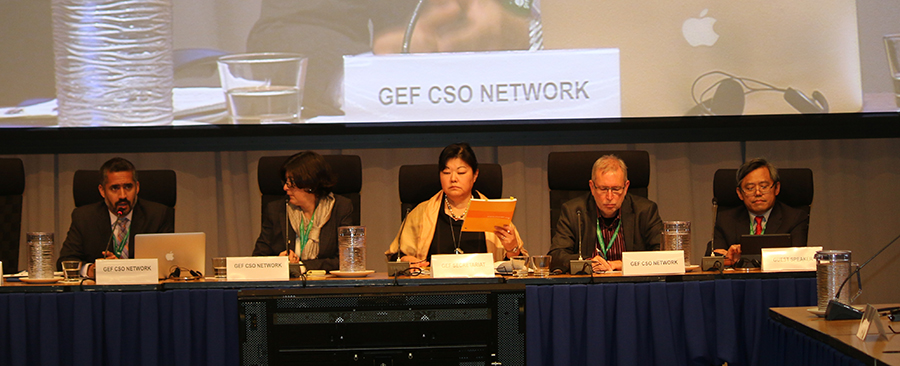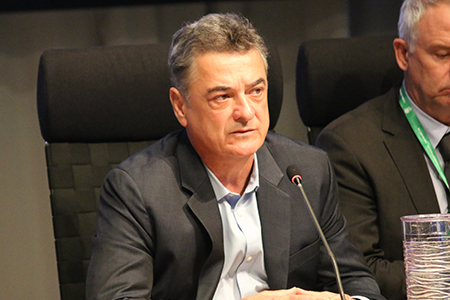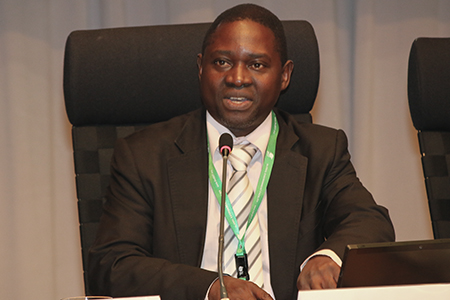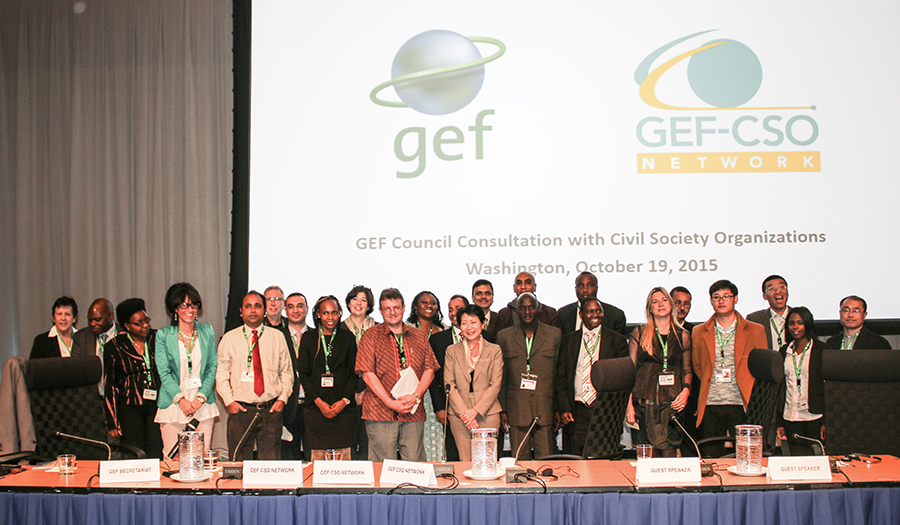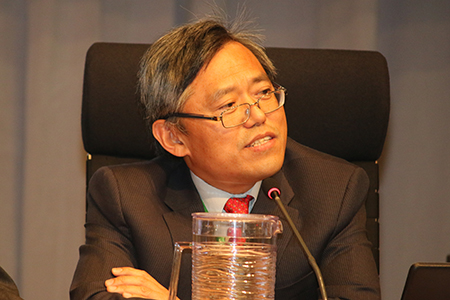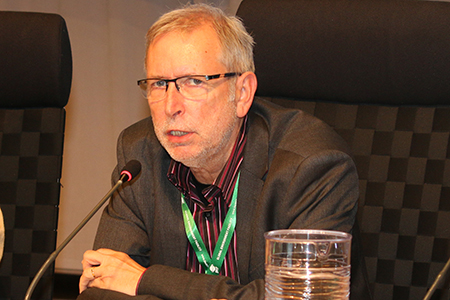Global Environment Facility (GEF) Council Consultation Meeting with Civil Society Organizations (CSOs), GEF 49th Council Meeting and 19th Meeting of the Least Developed Countries Fund
and the Special Climate Change Fund (LDCF/SCCF) Council
19-22 October 2015 | World Bank headquarters, Washington, DC, United States of America
Summary Highlights of the Meeting
Download ENB+ Meeting Report |
||||||
Receive our ENB+ bulletins and reports by email: |
||||||

| Follow @IISDRS | ||

Loading... |
||
|
Receive emailed updates with the news articles above plus related information and announcements from our SDG community mailing list: |
||
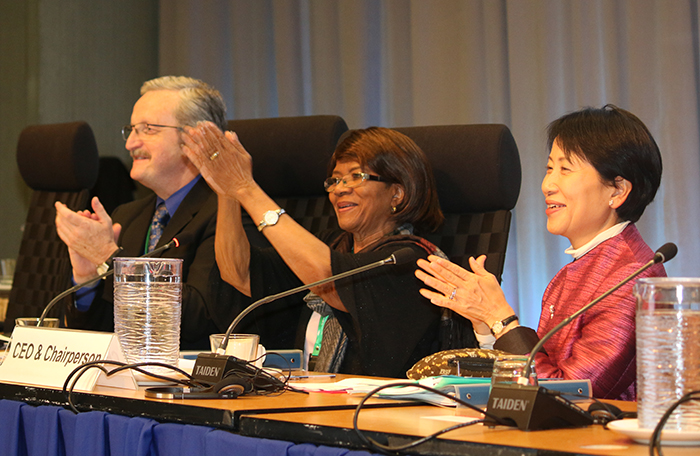
William Ehlers, GEF Secretariat, Anyaa Vohiri, Co-Chairperson (Liberia), and Naoko Ishii, GEF CEO and Chairperson |
||
Highlights for Thursday, 22 October 2015On the third and final day of the 49th meeting of the GEF Council, Council members met in Executive Session to consider the Report of the Selection and Review Committee, and agreed on dates for the 52nd Council meeting to be held the week of May 22 2017. Naoko Ishii was reappointed as s CEO and Chairperson of the GEF for a second four-year term. The decision was adopted unanimously, followed by many expressions of congratulations and affirmations of support. Delegates also convened as the 18th meeting of the Least Developed Countries Fund (LDCF) and Special Climate Change Fund (SCCF) Council. In her opening statement, GEF CEO Ishii emphasized the importance of adaptation to the Paris climate agreement and the positive role the LDCF and SCCF has played in implementing adaptation. She stated that a limited number of projects are presented to the Council due to lack of resources and called for further support for the funds to: not loose momentum; close the funding gap; and send a clear signal to the parties ahead of COP 21. The two pledges from Switzerland and Finland were made amounting to US$2.6 million for the LDCF and US$2.3 million for the SCCF on top of the US transfer of US$26.75 million received in September 2015 for the LDCF. The Council approved the work program comprising two project concepts. Council Members reviewed and approved Joint Summaries of the Chairs for both the GEF Council meeting and the LDCF/SCCF Council meeting, and CEO Ishii closed the meeting at 13:39 pm. |
||
IISD Reporting Services, through its ENB+ Meeting Coverage, has provided daily web coverage and published a summary report of the Global Environment Facility (GEF) Council Consultation meeting with Civil Society Organizations (CSOs) and GEF 49th Council Meeting which is available in HTML or PDF format. Available in ENB Mobile at: http://enb.iisd.mobi/gef-council49/ |
||
has been provided by the GEF
|
||||||||||||
|
||||||||||||
|
|
|
|
Highlights for Wednesday, 21 October 2015The forty-ninth meeting of the GEF Council convened for the second day on Wednesday, 21 October 2015, at World Bank headquarters in Washington D.C. During the morning the Independent Evaluation office (IEO) presented the Semi-Annual Evaluation Report of the GEF Independent Evaluation Office: October 2015, which replaces former reports and simplifies reporting. The Impact Evaluation of GEF Support to Protected Areas (PA) and Protected Areas Systems was then presented, highlighting that GEF’s support to PAs and PA systems is making a positive difference. Five main recommendations include: ensuring that GEF support targets areas rich in global biodiversity; addressing the socio-economic conditions that will ensure local community commitment to biodiversity protection; investing in broader governance issues to address large-scale drivers; developing a more reliable and practical monitoring system to track and assess results at the project and portfolio levels; and investing in understanding what works and why. Council members then turned their attention to the Knowledge Management Needs Assessment, and Part I of the Annual Monitoring Review (AMR). On the AMR the GEF Secretariat observed that: GEF-6 is on track in terms of expected global results on environmental benefits; the ratio of planned co-financing for approved projects in GEF-6 is higher than the GEF-5 average; portfolios under implementation appear to be performing satisfactorily; and there is still room for improvement regarding first disbursements and methodologies for collecting information. In the afternoon the Council considered the Work Program, and after a substantive discussion approved a Work Program for the GEF Trust Fund amounting to US$ 254.99 million. An Update on the Preparation of Integrated Approach Pilots was then addressed. |
||
|
||
|
||||||||||||
|
|
|
|
Highlights for Tuesday, 20 October 2015On Tuesday morning, 20 October 2015, Naoko Ishii, Global Environment Facility (GEF) Chief Executive Officer (CEO) and Co-Chairperson opened the 49th GEF Council meeting. She praised the new centrality of environmental sustainability in global policy discussions, noting the GEF’s participation in SDG-related discussions and its role as financial mechanism for the Rio Conventions and other MEAs. CEO Ishii highlighted the GEF Secretariat’s reorganization, which will enhance integrated programming and GEF implementation and pointed to the potential for the Non-Grant Instrument (NGI) to mobilize funding for natural resource management. She said this meeting’s discussions will affect the GEF’s future and noted the GEF’s 25th anniversary in 2016. The Council elected Anyaa Vohiri, Council member for Benin, Cote d’Ivoire, Ghana, Guinea, Liberia, Nigeria, Sierra Leone and Togo consistency as Co-Chair of the meeting and adopted the agenda (GEF/C.49/01/Rev.02). In the morning a panel discussion on the Amazon took place. Tom Lovejoy, Scientist and Amazon Expert highlighted the need to view and manage the Amazon as a system and presented a comprehensive map created by National Geographic publication, which could help improve integrated systems planning and management. Christian Samper, CEO, Wildlife Conservation Society, discussed research related to the Amazon. The Report of the Chairperson of the Scientific and Scientific and Technical Advisory Panel was presented was also presented. In the afternoon, Richard Kinely, Deputy Executive Secretary, UNFCCC spoke on preparations for UNFCCC COP 21. He expressed optimism for COP 21, depending on its outcomes on finance. He noted consensus to include the GEF in the post-Paris financial mechanism, commending the GEF’s record on adaptation finance. The agenda item on Future Directions on Accreditation was also considered. |
||
|
||
|
||||||||||||
|
|
|
||||||||||||
Highlights for Monday, 19 October 2015Session 1: CSO Dialogue with the GEF CEO and Chairperson: The GEF Council Consultation Meeting with Civil Society Organizations (CSOs) took place on Monday, 19 October 2015. Faizal Parish, Central Focal Point (CFP), GEF-CSO Network, noted the importance of engagement between GEF Council representatives and civil society on global environmental challenges. GEF CEO and Chairperson Naoko Ishii applauded the centrality of environment in the new Sustainable Development Goals (SDGs). She highlighted the GEF’s strategic investments to global environmental goals, which have additional impacts on poverty and development, and the importance of innovative financing such as the GEF’s Non-Grant Pilot Instrument, which mobilizes private sector funds to finance action on climate change. Discussion: Issues raised centered on inter alia the: cross cutting nature of knowledge management; role of the SDGs in channelling more funding to the environment and the GEF; need to move beyond the inter-governmental framework for tackling environmental issues to a more multi-stakeholder approach; and role of new data and technology in GEFs work. Session 2: Partnerships with Civil Society to meet GEF’s Targets and Sustainable Development Goals (SDGs) Mohamed Raouf, Regional Focal Point (RFP), West Asia, GEF-CSO Network, said the GEF’s mission contributes to all SDGs and called for new holistic partnerships. Akhteruzzaman Sano, South-east Asia RFP, highlighted the CSO Network’s new governance structure and its recommendations on the Public Involvement Policy and enhanced CSO engagement. Gustavo Fonseca, GEF Secretariat, reported on the GEF contributions to SDGs on climate, life below water and on land, and partnerships. Olivier Langrand, Executive Director, Critical Ecosystem Partnership Fund (CEPF) highlighted CEPF activities aimed at enhancing civil society participation in biodiversity conservation through regional implementation teams. On lessons learned, he recommended: working at the ‘hotspot’ rather than country level and taking a long-term view in terms of investing in CSOs. Priscilla Achakpa, RFP, West Africa, GEF-CSO Network, noted the role of CSOs in implementing, monitoring and ensuring accountability of GEF projects. She highlighted the GEF Gender Partnership Policy as a critical tool in measuring impacts on gender. Godwin Fishani Gondwe, GEF Council Member, Zambia, highlighted the need to strengthen institutional memory of the GEF both at the national and regional level and to institutionalise GEF national political focal points. Discussion: In response to questions on the relationship between the GEF and the Green Climate Fund (GCF) and maintaining GEF’s core mission and goals, Fonseca noted that the GEF and the GCF relations are still being constructed building upon what the GEF has done over 24 years. He emphasized the need to ensure that GEF’s core mission is not diluted, explaining that the GEF has started reporting to Conventions on GEF activities that result in multiple benefits. On lessons learned regarding implementation, Langrand outlined that CEPF’s work with regional and national NGOs has enabled the NGOs to become trusted government partners and allows CEPF to continue work on conservation in areas experiencing difficulties, such as Libya. Responding to a question on the integration of disaster risk reduction into the GEF’s work, Fonseca explained that the GEF Secretariat is discussing how to mainstream resilience within the entire GEF portfolio. On gender mainstreaming, Achakpa responded that gender reports and policies are often not implemented, even among the GEF agencies, and that there is a need for better monitoring and disaggregated data on funds allocated to gender issues. On the GEF and climate change, Ramon Cruz, RFP, North America, GEF CSO Network discussed: how the GEF will evolve and interact with the GCF; how post-2020 ambition will be addressed in the new financial architecture, and what will happen between now and 2020. Chizuru Aoki, GEF Secretariat, said the GEF’s role is to effectively operationalize the UN Framework Convention on Climate Change (UNFCCC) Conference of the Parties (COP) decisions and guidance and called for coordination and complementarity between different funds and financial institutions. Günter Mitlacher, CBD Expert Team, outlined the Convention on Biological Diversity (CBD) COP decision XII/30 for a participatory funding needs assessment to inform the GEF-7 replenishment negotiations. He noted that only two countries have returned questionnaires on funding needs over the next five years and urged Council Members and CSOs to push their governments to submit them. Ravi Sharma, CBD Secretariat, explained that a top-down funding needs assessment had been attempted before with limited success. Discussion: Participants raised questions on inter alia: meeting adaptation demands within the next five years; lack of parity between the adaptation and mitigation GEF portfolios; needs assessment and replenishment negotiations; mainstreaming biodiversity over different sectors; and what the CSO network needs to do in the lead up to the Paris Climate Change Talks. Closing Co-moderator Nana Janashia, RFP Eastern Europe and Central Asia, GEF-CSO Network summarized discussions on Public Investment Policy Review, knowledge management reform, and the role of CSOs in catalyzing action on the ground. |
||
|
||
|
|
|
|
|
|





